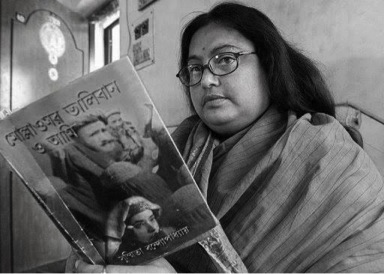
On September 5, 2013, Indian health-care worker and author Sushmita Banerjee was murdered by Islamic terrorists in her home in Kharana, in the Paktika province of Afghanistan. The authorities point the finger at the Taliban, who deny responsibility. Police have since arrested members of the Haqqani terrorist network for the murder.
Sushmita Banerjee, also known as Sayed Kamala, had married an Afghan businessman named Jaanbaz Khan and went to live in pre-Taliban Afghanistan. She started a clinic for Afghan women out of her home, but in 1993, the Taliban forced her to shut it down and threatened to kill her for not wearing the hijab and being a woman of “immoral character”. She first left Afghanistan for Pakistan, where she applied for help at the Indian embassy in Islamabad, which declined to do so for she lacked the appropriate papers. However, her brothers-in-law forced her to return to Afghanistan with a mixture of threats and a promise to help her return to India. Upon her return, she was imprisoned by the puritan Islamic regime in her home and continually threatened with death.
As the Taliban swiftly seized and consolidated power in 1995-96, Banerjee was beaten and sentenced to death. She escaped by tunneling through the mud walls of her house. She was stopped and interrogated at Afghanistan's border with Pakistan, but managed to escape the Taliban guards after asserting her Indian citizenship. Returning to India, she wrote an article “The Taliban Tattoo” in Outlook India, and published a book “Kabuliwalar Bangali Bou” (A Kabul man's Bengali wife) where she vividly recounted the terrorizing rule of the Taliban and her harrowing escape. The book brought her much fame and was adapted into a 2002-03 Bollywood film “Escape from the Taliban,” where Banerjee was portrayed by leading film star Manisha Koirala.
While many others would have been content with such success and a life of book tours, lectures and international activism, Banerjee made a decision to return to Afghanistan after the U.S.-led coalition liberated it from the Taliban and allowed a democratic government to take root. In the desperately poor nation, she set up her home in Kharana, where she re-established a medical clinic for Afghan women. She lived and worked unfazed by increasing Taliban-led terrorism amidst the scheduled withdrawal of NATO forces by 2014. Not accorded any “VIP” security by the Afghan government, the terrorists found it easy enough to walk into her home, bound and gag her husband, take her outside and shoot her. They then dragged her body and left it by the side of a religious school. In her final days, she had been filming the lives of local Afghan women as part of her work.
